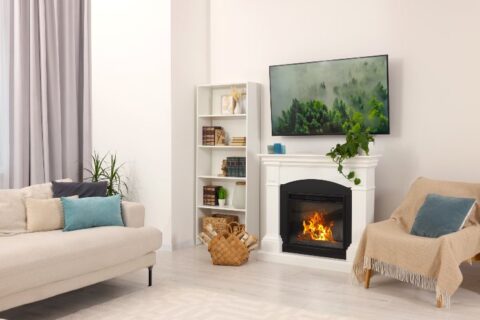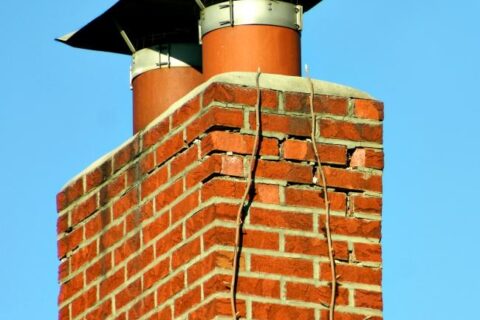Frequently Asked Questions Regarding Gas Fireplaces
Are you considering a gas fireplace for this winter? Chances are you have questions. In this article, we will share some of the most frequently asked questions and answers regarding gas fireplace inserts.
Gas Fireplace FAQs
1) What is a gas fireplace?
A gas fireplace is a type of fireplace that uses natural gas or propane as a fuel source. Gas fireplaces are more efficient than wood-burning fireplaces and produce less pollution.
2) What are the benefits of a gas fireplace?
There are many benefits to owning a gas fireplace. Gas fireplaces are very efficient. They produce more heat with less fuel than a wood-burning fireplace. They are also much cleaner, producing little to no smoke or ash. And finally, gas fireplaces are also very convenient, as they can be turned on and off with the push of a button. This final reason is the number one reason people choose a gas fireplace insert over a wood-burning fireplace.
3) What are the disadvantages of a gas fireplace?
The main disadvantage of a gas fireplace is the initial cost. Gas fireplaces are typically more expensive than wood-burning fireplaces. Like their woodburning counterpart, they also require regular maintenance, such as annual gas line inspections and chimney cleanings.
4) How do I choose the right gas fireplace for my home?
There are a few things to consider when choosing a gas fireplace.
• Type of fireplace
First, decide what type of fireplace you want. Gas fireplaces come in two main types: direct vents and natural vents.
○ Direct vent fireplaces
Direct vent fireplaces are sealed combustion units that draw air from outside the home and exhaust it back out through a pipe.
○ Natural vent fireplaces
Natural vent fireplaces use the air inside the home for combustion and exhaust it through the chimney.
• Size
Next, consider the size of the fireplace you need. Gas fireplaces come in a variety of sizes, so it is important to choose one that will fit in the space you have available. Chimneys vary in size and may taper in a way you don’t see. Our experienced professionals can help you get the right measurements before making your choice.
• Style
Finally, decide on the style of fireplace you want. Gas fireplaces come in a variety of styles, from traditional to contemporary. Often, the biggest difference is the face of the fireplace itself. But again, this is where having a chimney professional can come in handy. We can help you choose the right style for your home.
5) Why does a gas fireplace need an annual inspection?
Whether you have a gas fireplace or a wood-burning fireplace, debris has a way of gathering in the vents, flue, and inside the chimney itself. If it is allowed to stay there, it will most likely restrict the airflow and make your home smell bad. Debris from gas fireplaces includes:
• Deteriorating logs
The log inserts can deteriorate over time. The debris will cling to the sides of the insert.
• Dirt from the doors or door frame
If your glass doors and the frame of the insert are chipped or scratched glass, this may become a hazard. The debris from these can tamper with the heat output of the fireplace. Having your fireplace regularly inspected will reveal these sorts of problems.
• General residue
Both the inside and the outside of a gas fireplace should be cleaned occasionally.
As with any appliance, it is very important to follow the manufacturer’s instructions. This includes using approved cleaning products.
Let our team know if you have more questions about cleaning your chimney
or fireplace. We offer a wide range of services to keep your home and loved ones safe.
6) Are gas fireplaces dangerous?
One of the questions we are asked most often is about the safety of a gas fireplace.
Gas fireplaces are typically safer than traditional wood-burning fireplaces. But always keep in mind, as with ALL heating appliances, there may be potential hazards. Gas is a very efficient and clean-burning fuel, so when used properly, gas fireplaces pose no more risk than any other type of fireplace. Of course, as with any type of fireplace, certain safety precautions should always be followed.
Tips For Using A Gas Fireplace
If you’re a homeowner considering a gas fireplace, or if you already have one and just want to brush up on the basics, here are some safety tips to keep in mind.
- Make sure your gas fireplace is installed by a certified professional. This is the best way to ensure that your fireplace is properly vented and that all connections are secure.
- Never use flammable liquids or other materials to start or accelerate a gas fire.
- Keep combustible materials, like furniture, pillows, blankets, and clothing, at least three feet away from the fireplace opening.
- Never leave a gas fire unattended. Always extinguish the flames before leaving the room or going to bed.
- Have your gas fireplace serviced by a certified professional on an annual basis. This will help ensure that it is operating safely and efficiently.
By following these tips, you can enjoy your gas fireplace.
Gas fireplaces are a great option for those who want the benefits of a fireplace without the hassle of wood-burning fireplaces. Gas fireplaces are very efficient, produce little to no smoke or ash, and can be turned on and off with the push of a button. However, gas fireplaces are more expensive than wood-burning fireplaces and require regular maintenance, such as annual gas line inspections and chimney cleanings and inspections. When choosing a gas fireplace, consider the type (direct vent or natural vent), size, style, and efficiency of the unit. And be sure to always follow the manufacturer’s instructions for cleaning and maintenance.


